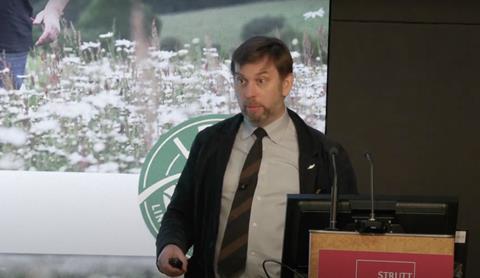Speakers emphasise the scale of change needed to respond to the climate crisis

LEAF’s Annual Conference on 1 February brought together expert speakers to explore ways to promote sustainable farm management practices globally.
There was a particular focus on the importance of Integrated Farm Management; the role of data as both a guide to intervention and a tool for reporting; and the role of public, private and civil society actors in facilitating the transition to sustainable farming practices.
Here are four key takeaways from the event in London.
David Webster
CEO of LEAF
“Many of the practices we have relied upon to increase agricultural productivity in the face of entirely legitimate needs to feed and clothe people have themselves caused, and are causing, huge environmental harms.
“Some 78 per cent of global ocean and freshwater pollution is attributed to agriculture and 26 per cent of greenhouse gas emissions. Deforestation, eutrophication, biodiversity loss – global agriculture has fed a growing global population efficiently, but has created enormous externalities, the consequences of which are becoming increasingly clear to us all. Not least to state policy makers in all western nations who are, as we speak, drafting legislation to force businesses to actively mitigate the risk of harm within their own supply chains.
“The pressure to act is evident and will become only more so as the pace of global warming escalates. The UN IPCC predicts that from 2030, climate-related impacts will start to make parts of the world we live in today completely uninhabitable. And agriculture will be one of the sectors most exposed to risk as we pass through the 1.5°C threshold over the coming decade, which is not very long.
“AI-driven research by Stanford University in the US modelled that global temperatures will rise above 2°C by 2060 even if measures are taken to rapidly decarbonise the planet over the next two decades. Changes in farm and land management practices are therefore likely to be required on an enormous scale.”
Professor Rosemary Collier
Professor of Integrated Pest Management, University of Warwick
“We’re far from having sufficient IPM tools to manage most crops effectively. More R&D is needed. The top two things on my list at the moment are the identification of useful plant traits through plant breeding. That is what we really need to speed up – the development of varieties to deal with all our future challenging situations. And then I think there’s a lot more to learn about diversity within cropping systems at a range of scales.
“From a crop production point of view, true IPM is probably achievable but not instantly. However, I’m convinced that even with effective IPM, we are not going to reverse the loss of nature and recover nature. And that requires imaginative thinking from farmers.”
Dr Alistair Leake
Director of policy, The Allerton Project, a LEAF Innovation Centre
“Really, regenerative agriculture is Integrated Farm Management focused more on the soil, and no more than that. But I am absolutely delighted that it has captured so many people to come in and join the movement.”
Professor Jane Rickson
Cranfield University and LEAF board member
“I would argue that soils underpin the economic, environmental and social pillars of sustainability. That, in turn, is related to human health and wellbeing. Healthy soils give healthy crops and that is associated with individual and national economic status.
“It’s about aiming to avoid soil degradation first of all, and then regenerating soil resources. It’s all about building back better by using integrated farm management practices for soil, land and crops.”
Cedric Porter
LEAF vice chair and agricultural supply chain journalist
“The most important thing is not just to remember [former LEAF CEO] Caroline Drummond but to build on her legacy.”



